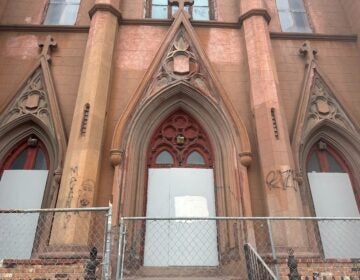Philly moves to regulate demolition

Philadelphia plans to tighten regulations on demolitions after a year of heightened fears of lead poisoning in construction-heavy residential neighborhoods.
At Thursday’s City Council session two bills were introduced, both drafted by the Department of Licenses and Inspections (L&I).
Mark Squilla introduced a bill that would set new dust control requirements at demolition sites, requiring fabric fencing, at least five feet high, to surround relevant properties. Debris couldn’t be stored outside the fencing, unless they are in a sealed dumpster or dump truck.
If materials are being dropped from 20 or more feet, an enclosed chute would be required. Where mechanical demolitions are underway and winds rise to faster than 20 miles an hour, operations would have to cease. (L&I notes that most demolition in the city is conducted by hand.)
After demolition is completed, and if a new structure isn’t immediately being built, the bill would require the laying of a layer of “granular material” atop the site four inches deep.
Many of the neighborhoods where fears have been most acute are in Squilla’s district, which not-coincidentally contains some of the city’s hottest residential areas. The Philadelphia Inquirer’s widely read “Toxic City” series focused attention on Fishtown in particular.
“After hearing residents’ concerns prior to the [Inquirer] report, and after the information we received from the report, we want to add regulations to the demolition process,” said Squilla. “We want to make sure residents in these areas are protected from lead dust or any other containments in the air.”
The bill introduced by Curtis Jones would reform the license requirements for demolition contractors.
Jones’ bill would require demolition contractors to attend trainings offered by L&I at least once a year. There workers would be briefed on the regulatory requirements of the Environmental Protection Agency, OSHA, the Streets Department, the Health Department, the Water Department and L&I itself. (The first of these trainings was held in August, although it wasn’t mandatory.)
‘The cost of the most expansive type of demolition bond—Class A, which allows its holder to demolish any building—will double from $25,000 to $50,000.*
The holders of Class A licenses will be required to have at least three years experience in the demolition profession. A demo supervisor and a site safety manager has to be on hand while a building is being torn down.
Jones’ bill would also require that those seeking demolition licenses comply with Water Department regulations regarding soil and Health Department air management regulations regarding dust. This is intended to allow L&I to take enforcement action against contractors who scorn the regulations of these other departments, which the agency is not currently tasked with doing.
“By folding these health and water department regulations into our licensure requirements we can take enforcement action on behalf of the whole city, since we are the ones out there with contractors,” said Guss.
The bills are not likely to receive pushback from the construction industry.
“[I have] no issue with the proposed changes,” said Brian Emmons, president of the Building Industry Association. “They appear to be best practices that all responsible contractors already do.”
The General Building Contractors Association is currently reviewing the bills, but observers expect them to be supportive. Some of their members were consulted in the crafting of the legislation and the larger, more professionalized companies pushed for the changes in licensing, specifically the caveat that Class A license holders have at least three years experience in the field.
The contractors most likely to be affected by the new regulations are smaller companies, especially those that work on residential demolitions. These companies work on tighter profit margins and the new regulations will make the job more expensive. Special dust control fabric isn’t free.
The next step for the bills will be the Committee of Licenses and Inspections, chaired by Maria Quiñones-Sánchez. Both Squilla and Jones are on the committee.
*This story has been corrected to reflect that the bond for Class A Lisenses is doubling, not the cost of the lisense itself. A quote from Guss was added to clarify what the bond accomplishes.
WHYY is your source for fact-based, in-depth journalism and information. As a nonprofit organization, we rely on financial support from readers like you. Please give today.







